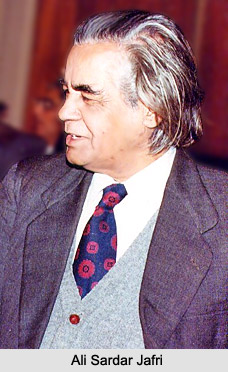 Ali Sardar Jafri was born in Balrampur in the Indian state of Uttar Pradesh. Later he came to Mumbai in the year 1942 and made it his home. He was arrested for writing against British rule in India, and was among the votaries of the progressive movement in Urdu literature. When he was very young, at the age of seventeen, his literary career kick-started, and since then he has written nine books of verse, two plays, memoir-reportage, three collections of critical essays and one volume of short stories. With the publication of his very first collection of Nazam and Ghazal, Parwaz, in the year 1943, he gained popularity and made himself a force to reckon with.
Ali Sardar Jafri was born in Balrampur in the Indian state of Uttar Pradesh. Later he came to Mumbai in the year 1942 and made it his home. He was arrested for writing against British rule in India, and was among the votaries of the progressive movement in Urdu literature. When he was very young, at the age of seventeen, his literary career kick-started, and since then he has written nine books of verse, two plays, memoir-reportage, three collections of critical essays and one volume of short stories. With the publication of his very first collection of Nazam and Ghazal, Parwaz, in the year 1943, he gained popularity and made himself a force to reckon with.
Early Life and Education
From a very early age, he was highly influenced by Josh Malihabadi, the lyricist Jigar Muradabadi and Firaq Gorakhpuri. He joined the Aligarh Muslim University (AMU) in the year 1933 and was soon exposed to the Communist ideology, and then in 1936, for absolutely political reasons, he was subsequently he was expelled from the University.
He eventually, in the year 1938, graduated from subsequently he was expelled from the University. But he could continue his post graduation studies as he had to end it prematurely following his arrest during 1940-41 for writing anti-War poems, and taking part in Congress led political activities as Secretary of the university`s Students` Union.
Literary career of Ali Sardar Jafri
Ali Sardar Jafri, throughout his writing life, published several poems. His first collection of short stories titled Manzil (Destination), which kick started his literary career, was published in the year 1938. And then his first collection of poems came out in the year 1944 named Parvaz (Flight).
He, in the year 1936, presided over the first conference of Progressive Writers` Movement in Lucknow, a stature he maintain for the rest of his life. Few years later, in the year 1939, he became co-editor of Naya Adab, a literary journal devoted to the Progressive Writers` Movement, and the journal continued till 1949.
He was involved in many political, social and literary movements. As a result he was arrested on 20th January 1949 at Bhiwandi for holding of a Progressive Urdu writers` conference (which is now a banned organization)
His important works as a lyricist include Dharti Ke Lal (1946) and Pardesi (1957). Among his other poetic works Khoon Ki Lakeer (1949), Ashia Jaag Uttha (1951), Patthar Ki Deewar (1953), Pairahan-e-Sharar (1966), Lahoo Pukarta Hai (1978) and November, Mera Gahwara (1998) is remarkable, both for their theme and style.
The principal theme of his poetry was love, compassion, perseverance and sensitivity surviving in the middle of the unfeeling brutality. He, in his unique style, depicted the commendable continued existence of the human spirit in face of all-pervasive difficulty hardship and defeatism.
Awards Received by Ali Sardar Jafri
Ali Sardar Jafri was the third Urdu poet who received the Jnanpith Award in the year 1997 after of course Firaq Gorakhpuri (1969) and Qurratulain Hyder (1989). Apart from this he has also been conferred with many other awards as well which includes Padma Shri in 1967, Gold medal from the Pakistan Government for Iqbal studies (1978); Uttar Pradesh Urdu Academy Award for poetry, Makhdoom Award, Faiz Ahmad Faiz Award, Iqbal Samman of the Madhya Pradesh government and the Sant Dyaneshwar Award of the Maharashtra government.
He, in the year 1986, received a D.Litt. from Aligarh Muslim University after he was expelled from the university. Most of his poems have been translated into various foreign languages.
Ali Sardar Jafri married Sultana in January 1948, and the couple had two sons.













